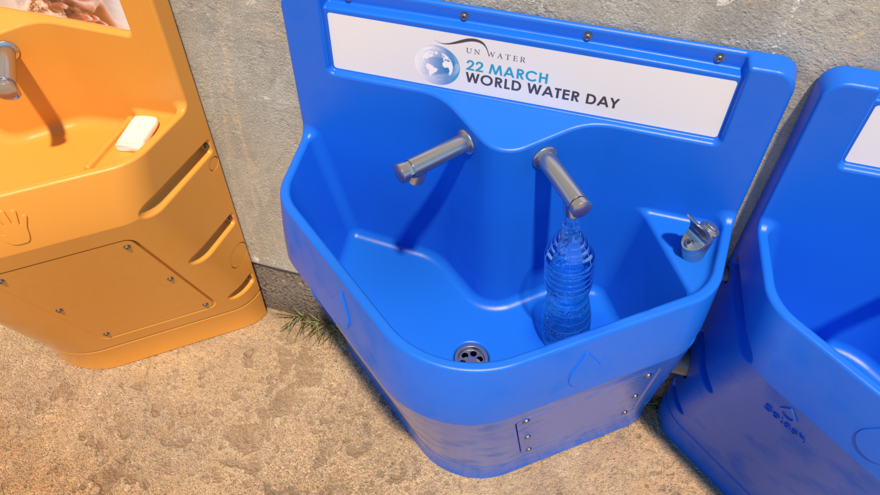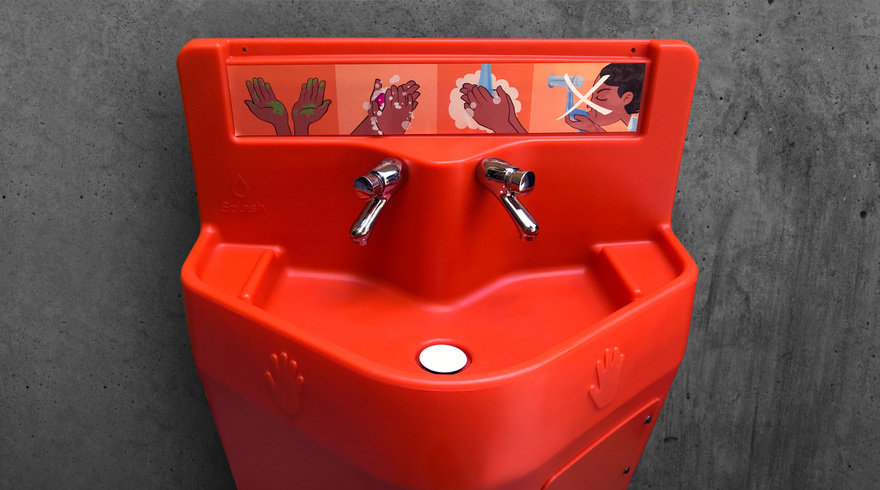
Behavior-changing drinking and handwashing stations for kids
Innovation design firm Artefact and international development organization Splash designed a pair of drinking and handwashing stations that encourage healthy hygiene habits for children living in urban poverty and offer a new solution for the water, sanitation, and hygiene (WASH) sector.
Splash identified a need for improved handwashing and drinking water stations in the countries where they work in Africa and Asia, but were unable to locate durable, high-quality products. The stations available in the market were time consuming to construct and maintain, and made from low quality materials that broke with repeated use. Additionally, stations were designed for adults, rather than children, with tall basins and sharp edges and corners.
Artefact and Splash combined years of behavior change research findings with smart industrial design to craft unique drinking and handwashing stations that are both engaging for children and accessible to local communities. Their inventive yet simple form also allows for local manufacturing and easy installation and maintenance.
Community is at the heart of the stations' design. The new drinking and handwashing stations are designed for use in schools and other child-serving, institutional settings for the widest impact in educating and inspiring healthy habits. The station designs ensure that children gravitate to – and drink from – a safe water source and separate drinking and handwashing behaviors, reducing the potential for disease transmission.
Through their Project WASH in Schools for Everyone (Project WISE), Splash will deploy these stations at more than 2,000 schools in India and Ethiopia over the next five years, reaching one million kids. Through Splash Social Enterprise LLC, their goal is to sell these stations to community organizations and governments as well. The stations will help consistently reinforce good hygiene habits and improve well-being throughout the community for both children and adults.
Design Team
Nick Ellington, Splash, WASH Infrastructure Manager
Eric Stowe, Splash, Founder and Director
Megan Williams, Splash, Senior Manager of Behavior Change
Mike Kollins, Splash, Director of Programs
Leslie Llado, Splash, Sustainability Manager
Markus Wierzoch, Artefact, Executive Creative Director
Dustin Horn, Artefact, Lead Industrial Designer
Neeti Sanyal, Artefact, Director of Strategy
Clement Gallois, Artefact, Former Lead Industrial Designer
Benoit Collette, Artefact, Former Associate Industrial Design Director
Emilia Palaveeva, Artefact, Former Vice President of Marketing
The Splash drinking and handwashing stations use the power of design to educate, encourage healthy habits, and improve lives at scale, one child at a time. The result is a behavioral research-driven, culturally conscious, highly scalable design with several innovative features.
Research-driven design. Artefact and Splash developed a novel triangular design that allows children to see and interact with each other when handwashing, while remaining suitable for local wall plumbing. The design is informed by research from UNICEF suggesting that children who see each other wash their hands are more likely to adopt and sustain the habit.
Visual signals. Bright colors and functional icons differentiate safe drinking water stations from handwashing stations, promoting separation of drinking and handwashing behaviors and reducing the potential for disease transmission. Additionally, the drinking water station has a deeper sink to allow for a one-liter bottle to be easily filled, while the handwashing station has a shallow basin to discourage drinking. Handwashing stations have conspicuous soap trays that prompt children to use soap or replace it if it is missing.
Culturally conscious. The drinking stations have water fountains on the right-hand side to respect cultures that require eating and drinking with the right hand.
Community-friendly. With pre-installed plumbing and a smooth exterior, the stations are simple by design so that schools and institutions can easily install and maintain them. There is no need for specialized labor or tools.
Local context. The use of rotationally molded plastic makes for more consistent and cost-effective manufacturing that can occur in the countries where Splash works. This helps facilitate technology transfer and wide-scale adoption.
-
oFavorite This
-
QComment
K
{Welcome
Create a Core77 Account
Already have an account? Sign In
By creating a Core77 account you confirm that you accept the Terms of Use
K
Reset Password
Please enter your email and we will send an email to reset your password.









